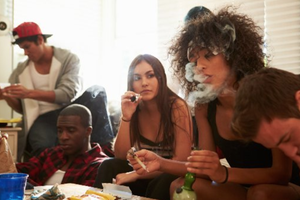How to tell if your teen is using drugs

A NACADA report revealed that drugs are readily available in schools, canteens, bars, and shared by friends and school workers.
What you need to know:
- There are a few signs you can look out for, which will indicate that your teen might have started taking drugs, alcohol or other substances.
Drugs are a huge problem among teenagers. It is estimated that by the time they graduate from high school, one in four teens has tried an illegal drug, and one in two have drank alcohol. This can be alarming to parents as it is hard to tell whether your teenager is into drug abuse, due to their secretive nature.
However, there are ways to determine if your teenager may be abusing substances like marijuana, cocaine, heroin, methamphetamines, or any other type of drug.
NACADA report on teen drug abuse
Over the years, the authority has carried out surveys in primary and secondary schools, revealing the scale of drug use among students. According to the study conducted by NACADA, 20.2percent of primary school kids have used at least one illicit drug or intoxicant of abuse in their entire lives.
At the time of the study, 16.9percent of primary school children were still using at least one drug or intoxicating substance. They also uncovered that 3.2percent of primary school pupils are presently using tobacco, while 2.6percent are using alcohol, and 2.3percent are using miraa/ muguka.
These drugs were said to be readily available in schools, canteens, bars, and shared by friends and school workers.
The report revealed that drug abuse is a significant because of academic indiscipline among primary and secondary school students. The majority of these instances, such as strikes, are linked to drug use.
Identifying drug abuse in teens
It is not easy to tell if your teen has started experimenting or abusing drugs. As mentioned above, teens are secretive about their activities. Therefore, it may be hard to know if something is wrong. However, there are a few signs that you can look out for which will indicate that your teen might have started taking drugs or abusing substances:
- Watch for changes in their behaviour: A teen that is using drugs is likely to have significant behavioural change. In an interview with Aunt Truphena, a counselling psychologist who also writes for Nation Africa, she suggests that several changes in teenagers like getting home late, throwing tantrums, and isolating could be signs of drug abuse. A change in physical appearances, such as poor personal hygiene, is another sign.
- If their grades start to decline, it may be a red flag as well since drugs can make teens forget about important things such as school and studying. They might also miss classes without explanations or neglect homework assignments altogether. In addition, they may have little motivation to participate in sports activities, which they used to enjoy before.
- Aunt Truphena urges parents to check their teens' rooms for traces of drugs or any evidence of substance use. For instance, teens may leave empty beer bottles under their beds or packets of cigarettes, which would signify that they have been smoking.
- Keep an eye on what is being downloaded from the internet as some websites offer illicit drugs for sale and might even give instructions on how to use them.
- Pay attention to how much money they are spending - drugs can be expensive. Drugs and the substances that teens abuse can be costly. For instance, cocaine is a stimulant drug with high demand in the market and is very addictive. This may result in your teen running out of money quickly due to their addiction, thus making them resort to desperate measures such as stealing from you or, even worse, taking up a part-time job to fund their habit.
If you notice that your teen has been asking for money more often or seems preoccupied with how much cash is in the house, then they may be spending too much on drugs and other substances such as alcohol.
What to do when you find out your teen is on drugs
Do not ignore the problem. Approach your teen tactfully. When you find out that your child is abusing drugs or substances, the first step is to stay calm. Approach them with love rather than anger as they are highly suicidal in this state and may resort to self-harm as coping mechanisms.
Befriend your teenager to get information about the drugs since they may not trust adults due to the fear of being judged or punished. For example, find out if a gang participates in getting them addicted, how long have they been using drugs, and what substances they are taking?
Seek help, do not punish. Note that the teen being under the influence of drugs, punishments may not be effective. Instead, it is advisable to seek help from a trusted rehab centre. Trying to solve the problem without professional help can, in many instances, cause depression in parents too.
Rehabilitation is not a punishment but rather an opportunity for the teen to get treatment and help. Rehabs offer programs designed specifically for teens as they have diverse needs that should be met to ensure their successful rehabilitation. Encourage your teen girls to visit rehab centres. Unfortunately, most parents are reluctant to rehabilitate their girls. This is evident by the sparse number of rehab centres that accommodate girls.
If your teen is on drugs, you can tell by watching out for the changes in their behaviour as mentioned above. Parents should be vigilant and approach their teens tactfully. Befriending them ensures that the information about drug abuse is gotten from a trustworthy source rather than on assumptions. Rehabilitation does not need to be seen as a punishment but rather an opportunity for treatment that can successfully overcome addiction in teenagers who are suffering.



